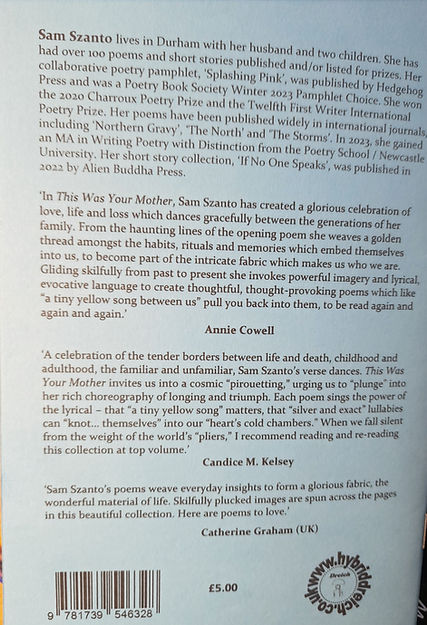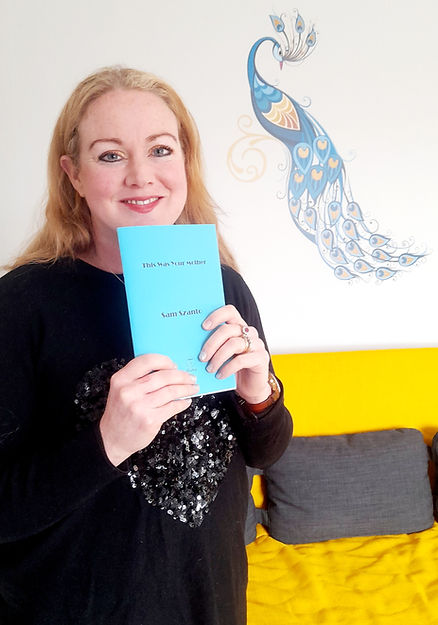20 Questions with... Paul Ings
- samszanto2
- Oct 10, 2022
- 6 min read

Paul Ings was born in Bournemouth, UK, in 1971, and has spent the last 30 years in the Czech Republic working in teaching and translation including a course at the University of West Bohemia on English Literature Written by Non-native Speakers.
His poetry has been published in magazines including The Reader, Magma, The Interpreter's House, Ink Sweat and Tears, Salzburg Poetry Review, South, etc., and in the anthologies Hair Raising (Nine Pens Press), The Joy of Living (Dreich), You’ve Got So Many Machines Richard! (Broken Sleep), Hildegard (Poetry on the Lake), Eternal (Hammond House), Cornwall (Palores Publications), and he was a joint winner of the Exmoor Society poetry competition in 2019. There have also been translations of Czech poetry (BODY Literature) and reviews in the Czech journal of international literature Plav.
His first pamphlet, One Week, One Span of Human Life, was published by Alien Buddha Press in August 2022.
Twitter: @frismipa
Linktree: https://linktr.ee/paulings
Please introduce yourself. Where are you from? What was your life like growing up?
Born in Bournemouth, first 8 years in Salisbury, 10 years in Tavistock, Devon, studies in Dundee (perhaps I passed Don Paterson on the street and never knew it?). I generally enjoyed an idyllic childhood with devoted parents and my brilliant sister in beautiful settings. My home is now in Pilsen, Czech Republic where I live with my wife and two kids.
Did you always want to be a writer? If you also work, what do you do / did you do?
Wanting to write (rather than be ‘a writer’) grew out of a growing love of literature and that I always seemed to fall in with types who felt it the most natural and essential thing in the world to make music/art/song/poetry etc.
Tell us about your most recently published work in a sentence.
Living in the Czech Republic most of the year I teach English and translate (I’ve lived here for 30 years).
I have just published ‘One Week, One Span of Human Life’ with the Alien Buddha Press, a poetic collage of images that should unite generations, life experiences and time under one roof, the roof of here and now, this week and always.

What are you working on right now?
Right now, I’m working on a difficult stanza in a rather jovial, formal poem that has made me laugh out loud as I write it (possibly a bad sign?). This is not my usual style or approach, but today it’s doing it for me; there is a darker aspect beneath the surface of the poem which is keeping me interested.
Do you have a writing routine, and if so what is it?
My writing routine is to wait, as a heron making like it’s not there, for a precious hour (at least) each day to make my strike (I am self-employed and overworked with kids).
Where do you write – always in the same space, or different places? Can you write ‘on the move’?
I write where I can, in the car, in a café, standing on a pavement, but rarely at home where our small house is too crowded.
What advice do you have for other authors who are starting out? What is the best advice you’ve heard?
I don’t know how to advise those starting out. My ‘starting out’ lasted at least 10 years. But you must read what you love, not what others tell you to read, and write with a genuine sense of underlying artistic joy as your guide, even if the poem/work is a sad/difficult theme and you may be unhappy at the time.
Best advice I’ve heard? ‘It’s all in the detail’ or words to that effect. And work hard and don’t be lazy when it comes to your art.
Do you enjoy doing live readings or are they a necessary evil – or somewhere in between?
There are so many ways and styles of reading aloud that I learned not to be too self-critical, although I usually find myself brimming with admiration for most of the other readers. I don’t rate myself. The stage is a place I die on. The words though, sometimes seem to get through by themselves which is nice. I need more experience. I live abroad, as I said.
Are there recurring themes in your work? Where do you feel these emanate from if so?
There are some recurring themes because my work is generally sparked by moments/visions/events etc. from life as I pass through it. But I love incidental poetry which doesn’t get enough respect by far.
Should writers have a moral purpose? What is the purpose of a writer in today’s society?
Every writer would say they have a moral purpose, even if it’s just to love and indulge in art in the most decadent or joyous manner possible. How can we be amoral as artists? If you are amoral, you are not an artist, possibly not a person at all. But the moral aspect can be the soil you don’t see below the grass. Whether an artist has a specific moral duty to society; well each must decide for themselves to stay true to themselves and their art. As for the behaviour and ideas of artists outside of their art in their private lives? I hold them to the same standards as I do anyone else. I can let some things slide, some not. I am not an angel myself, is anyone? Artists are people. Thank God for that.
Do you write between genres or not?
Well, pertinent question. One of the first things I wrote was a 300 page novel bursting with overambition. It’s terrible but served to show me that I need to write poetry. Then, years later, during covid, I set out to explore the prose poem and ended up spending a year writing a sort of novella, about 40/50 thousand words. It’s sitting in a box wondering if it is a poem or a novel or a novel-to-be or paper for recycling. Poetry is my true love as a writer though.
Which living writers do you most admire?
Oh, don’t get me started. Alice Oswald and Don Paterson from the mid/late careerists spring to mind. Luke Kennard seems to keep me coming back in recent times. But really, there is a world of poetry. Since joining social media last year and publishing my pamphlet I am discovering a wealth of talent I was unaware of including Matthew Stewart, Annick Yerem, Louise Longson, and a host of younger poets from Alien Buddha Press, Nine Pens publishing, and several others. (I’m sticking to English language poetry here).
Which dead writers do you most admire?
Far too many to mention, which in fact is the case for the previous question, but copies of the complete Hardy and Emily Dickinson are always next to my bed and lead me nightly into sleep.
What’s the book you wish you’d written?
The great work I’ve yet to write.
What other external influences do you have: nature/place, music etc?
Anything and everything.
Do you suffer from ‘writer’s block’ and how do you overcome it if so?
I do not suffer from writer’s block unless I can include external blockages to my physically sitting down with a pen to write in my own little space.
What’s been your favourite reaction to your writing?
Perhaps that a range of writers who I admire and friends whose opinions carry weight for me have praised different poems from my new collection across the range of work that it contains. But there have been the truly ecstatic reactions, which is wonderful and yet hard to process.
How do your family and friends feel about your writing?
A varied answer of course. Some adore it, but many are not fussed about poetry. From those that don’t read or relate to poetry well, they usually find individual poems touch them, which is as special and rewarding as any other reaction.
Do you have a favourite bookshop?
My location is a hindrance. I love the Oxfam in Tavistock when I get home. I love the unexpected.
How do you see the future of writing? Will we become more or less dependent on Amazon?
I don’t see the future of writing as relating to Amazon. It is a retailer and as such can be useful to writers and publishers, not the other way around! Perhaps we can already see publishers organizing themselves to market and sell via their own websites, and poets doing the same via social media, festivals and readings. The fundamentals, however, will not change too much. There will be writers, readers, writer/readers, supply and demand.











Comments